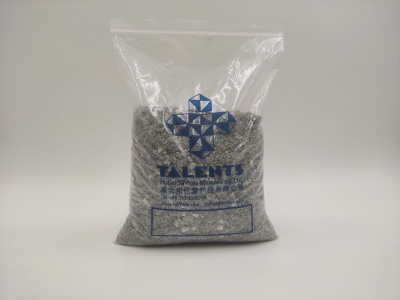Oil Drilling Grade Barite
Product Features:
API barite is produced from natural barium sulfate ores.
Our Barite Ore is 4.21 gravity and 90 purity, the processed Barite is milled to 200 mesh.
Commonly used as a weighting agent for all types of drilling fluids in oil and gas exploitation.
Talents drilling barite manufactured to meet or exceed all API 13A requirements.
Our drilling grade barite also can be used in applications with low purity and low whiteness requirements.
Oil Drilling Grade Barite Technical Date
| Index & Standard | API Standard | Analysis Result |
| Specific Gravity | 4.20 g/cc, min | 4.21 g/cc, min |
| BaSO4 | / | 90%, min |
| SrSO4 | / | 1.5%, max |
| Hg | 1 ppm, max | 1 ppm, max |
| Cd | 3 ppm, max | 3 ppm, max |
| Pb | 1000 ppm, max | 500 ppm, max |
| As | 40 ppm, max | 20 ppm, max |
| SiO2 | 3%, max | 3%, max |
| Fe2O3 | 1% ,max | 1%, max |
| Carbonates | 3000 mg/l, max | 3000 mg/l, max |
| Water Soluble Alkaline Earth Metals As Calcium | 250 mg/kg, max | 100 mg/kg, max |
Product Models:
| Index | TLZ-DB302 |
| Appearance | Powder |
| Specific gravity | 4.20 |
| Grain size / Particle size | 200 mesh |
Oil drilling grade barite is a vital industrial mineral used extensively in oil and gas exploration and production. With its unique physical and chemical properties, oil drilling grade barite is a critical component in drilling fluid formulations, providing density and stability that ensure safe and efficient drilling operations.
What Is Oil Drilling Grade Barite?
Oil drilling grade barite, also known as barium sulfate (BaSO₄), is a high-purity, high-density mineral used as a weighting agent in drilling muds. The oilfield industry demands barite with a specific gravity of at least 4.2, minimal impurities, and consistent particle size distribution. This quality standard ensures barite performs optimally in both onshore and offshore drilling environments.
The primary function of oil drilling grade barite is to increase the hydrostatic pressure in the wellbore, which helps control formation pressures and prevent blowouts during drilling operations.
Key Properties of Oil Drilling Grade Barite
High Specific Gravity (≥ 4.2)
Critical for increasing the density of drilling muds to balance formation pressure.Low Solubility
Prevents chemical interaction with other drilling fluids and downhole formations.Chemical Inertness
Ensures stability and compatibility with other drilling additives.Fine Particle Size
Enhances suspension in mud and reduces abrasion on equipment.
These properties make oil drilling grade barite irreplaceable in deep well and high-pressure drilling operations.
Applications of Oil Drilling Grade Barite
Weighting Agent in Drilling Fluids
The most common application of oil drilling grade barite is as a density enhancer in water-based and oil-based drilling muds.Pressure Control
By increasing the weight of drilling fluids, barite helps maintain wellbore pressure, preventing formation fluid influx.Wellbore Stability
Reduces the risk of collapse and stuck pipe, especially in deep and deviated wells.Environmental Compliance
High-purity oil drilling grade barite meets environmental regulations in offshore drilling, especially in the Gulf of Mexico and North Sea.
Global Market Insights and Demand Trends
The global demand for oil drilling grade barite continues to grow, driven by expanding oil and gas exploration activities, especially in the Middle East, North America, and West Africa. As energy companies push into deeper and more complex reservoirs, the requirement for high-quality, consistent-grade barite is increasing rapidly.
According to industry data, the oil drilling sector accounts for over 85% of total barite consumption globally, with leading producers located in China, India, Morocco, and the United States.
Quality Standards for Oil Drilling Grade Barite
To be classified as oil drilling grade barite, the mineral must meet API (American Petroleum Institute) or OCMA (Oil Companies Materials Association) specifications, including:
Specific Gravity ≥ 4.2
Water Soluble Alkaline Earth Metals ≤ 250 mg/kg
Residue on 75μm sieve ≤ 3%
Moisture Content ≤ 1%
Compliance with these standards ensures barite performs reliably across various drilling conditions.
Advantages of Using Oil Drilling Grade Barite
Enhanced Drilling Safety: Prevents kicks and blowouts by balancing formation pressure.
Cost Efficiency: Reduces the need for other additives and minimizes equipment wear.
Operational Reliability: Consistent mud properties result in fewer delays and downhole issues.
Environmental Compliance: High-purity barite minimizes heavy metal contamination in discharged fluids.
Choosing the Right Supplier of Oil Drilling Grade Barite
Selecting a trusted supplier for oil drilling grade barite is critical to ensure drilling performance, safety, and compliance. Key factors to consider include:
Consistent API/OCMA Grade Supply
Large-Scale Production Capacity
Global Logistics Support
Laboratory Testing and Certification
Tailored Particle Size and Packaging Options
An ideal supplier will not only provide high-purity barite but also offer technical support and on-time delivery to meet drilling schedule requirements.
Future Outlook and Sustainability in Barite Production
With the rising importance of environmental regulations and sustainable resource management, producers of oil drilling grade barite are investing in:
Cleaner Mining Practices
Advanced Beneficiation Technology
Barite Recovery from Drilling Waste
Global Warehousing for Faster Delivery
Innovation and efficiency in barite production will play a pivotal role in supporting the evolving needs of the oil and gas sector.
Conclusion: The Strategic Role of Oil Drilling Grade Barite
In the high-risk, high-reward world of oil and gas drilling, oil drilling grade barite remains a cornerstone material. Its ability to control pressure, ensure wellbore stability, and maintain drilling efficiency makes it indispensable in today’s energy industry.
For companies aiming to optimize drilling performance and comply with global standards, sourcing high-quality oil drilling grade barite is not just a necessity—it's a strategic investment.





